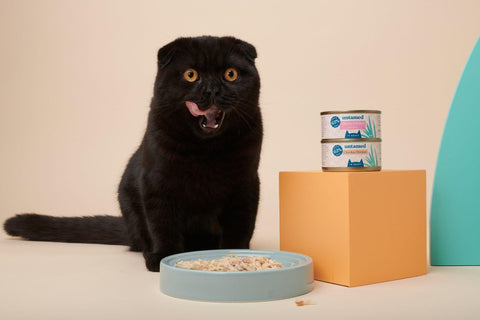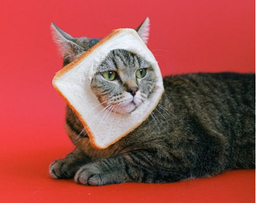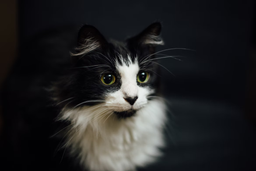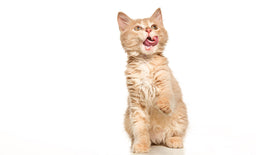What is the best food for a sick cat—how to encourage them to eat when they’re unwell
It’s a struggle to determine what cats should or should not eat when they’re sick. Whether it’s seasonal flu or a nasty bout of diarrhoea, the right food can help them recover faster.
The best food for a sick cat should have enough nutritional value and hydration for their daily sustenance. Unlike humans, cats cannot live off their bodies’ energy reserves for long. Their livers give out easily when they don’t receive nourishment from food, leading to rapid multi-organ failure.
Another troubling issue with sick cats is their general aversion towards most types of food. Even if you serve your cat something delicious, they may turn their head away.
We have prepared this guide to help you figure out the best meal plan for your ailing cat. We will also examine potential reasons why your feline may reject food when sick and present practical tricks to coax them into eating while they heal.
What to give a sick cat to eat
When your cat gets sick, you should consult a veterinarian immediately. Gastrointestinal issues like sporadic vomiting, diarrhoea, and loss of appetite are common symptoms of many conditions, ranging from dental and bladder infections to diabetes, allergies, and hairballs. Observe your cat for 10–12 hours after the first symptoms. If the situation doesn’t improve, don’t hesitate to take them to the vet.
Once you get the diagnosis and the recommended treatment, you should focus on giving them nurturing meals for a speedy recovery. The diet for a sick cat should include the following:
- Animal proteins
- Vitamins and minerals
- Moisture

Don’t let anxiety consume you when your cat needs you—managing temporary health setbacks is easy with the right food.
Source: Phúc Nguyễn
Animal protein and a cat’s health
Sick cats need highly digestible and bioavailable proteins for recovery. Being obligate carnivores, they take the necessary amino acids, like taurine and arginine, from meat, fish, and organs. It’s crucial that the proteins for sick cats come from whole meats and not animal byproducts or vegetable sources as they can be harsh on your feline’s already compromised digestive system. A diet with a high concentration of animal proteins boosts your cat's immune system by:
- Increasing the production of phagocytes and lymphocytes that trigger their immune response
- Regulating the flow of oxygen throughout the body
- Balancing bodily fluids
- Accelerating wound healing in cats recuperating after neutering or a bladder stone removal surgery
- Reducing inflammation and pain
- Providing the calories necessary for sustenance—each gramme of protein releases four calories during metabolic processes
When buying cat food for your sick cat, choose allergen-free products as they are easier on an overstressed digestive system.
Vitamins and minerals needed for recovery
Vitamins and minerals support organ function, protein absorption, and immune response in sick cats. Felines usually get these micronutrients from quality whole meat, but sick cats may have a deficiency due to fluid loss and electrolyte imbalance. If you fear your ailing cat’s vitamin or mineral intake is inadequate, reach out to your vet to get prescription supplements.
The table below outlines some of the crucial vitamins and minerals your cat needs:
|
Vitamins |
Minerals |
|
● Vitamin A ● Vitamin D ● Vitamin E ● Vitamin K ● Thiamin ● Riboflavin ● Pantothenic acid ● Niacin ● Pyridoxine ● Folic Acid ● Biotin ● Vitamin B12 ● Choline |
● Calcium ● Phosphorus ● Manganese ● Zinc ● Iodine ● Potassium ● Iron ● Copper ● Sodium and chloride ● Magnesium ● Selenium |
Hydration is crucial for sick cats
Dehydration can be rapid if your cat is sick and losing fluids, and it can lead to organ shutdown, coma, and even death. Here’s how to keep your feline hydrated:
- Give them fresh water—Cats tend to avoid drinking stale water. To encourage your sick kitty to drink more, clean their bowl regularly and refill it with fresh water every few hours
- Feed them wet food—Every serving of wet food contains about 110–130 millilitres of water, but you should ensure the meat in the product has not gone off or turned rubbery. Wet food for sick cats should have soft, meaty chunks in jelly or light gravy for easy digestion. You can also feed them hypoallergenic semi-moist cat food, but such products are usually quite expensive, and their efficiency is questionable
- Cook them soups and broths—If your sick cat isn’t too keen on drinking water, give them homemade chicken soups or bone broths, minimally seasoned. Both are easy to make and provide adequate hydration and energy to sick felines. Avoid buying ready-made soups because they may contain too much salt, harsh chemical preservatives, and flavour enhancers that are harmful to cats
- Get veterinary help—If your cat keeps losing fluids despite your efforts, take them to the nearest clinic to get IV hydration therapy. Some vets also prescribe oral syringes for additional water intake. With a bit of practice, you can learn to use these syringes safely at home

Weary or withering? Pay attention to the warning signs and get medical help on time.
Source: Min An
Food for sick cats—what to avoid
Considering a sick cat’s weakened ability to digest, avoid feeding them the following:
- Carbohydrates—Healthy felines don’t need carbohydrates to survive, although they can digest them. Sick cats may have a hard time breaking down carbs, even in small amounts. Coarse grains, rice starch, bread, etc. can increase stomach sensitivity in cats with poor digestion
- Fats—Cats need small amounts of fats in their diet, ideally derived from animals. The problem with fat is that it slows down the metabolism, making sick cats feel drowsy and lethargic. That is why vets recommend giving lean meats, like chicken and tuna, to sick cats. Beef, lamb, and eggs may be rich in protein but are too fatty for sick cats and should be avoided altogether
- Milk—It’s a common misconception that milk is nutritious to cats. The truth is the high fat and lactose content in milk and dairy products can overwhelm the feline digestive system and worsen stomach upsets in sick cats
- Raw food—Biologically Appropriate Raw Food (B.A.R.F. food) like raw chicken, freeze-dried turkey, etc., can work for healthy cats but is harmful to those struggling with digestion. A study of commercially available raw food from 2011–12 found that almost 25 per cent of the products were contaminated with bacteria. A bacterial infection can only make matters worse
- Fruits and vegetables—They are nutritious for ailing humans but can negatively affect sick cats. Healthy felines can eat bite-sized cuts of some fruits and veggies, like bananas, strawberries, apples, pumpkins, and peas, as occasional snacks, but cellulose doesn't agree with an upset tummy
Food for ailing or recuperating cats—do they need a liquid diet?
Many cat parents think liquid diets are the best option for sick or recuperating cats, but that is not true. In practice, only cats with specific medical conditions, like chronic kidney disease or renal atrophy, are prescribed a liquid diet, usually as a last resort. Let’s look further into how popular food textures work for sick cats.
Dry food for sick cats
While biscuits are affordable and easy to store, vets do not recommend a dry food diet to any cat, let alone sick ones. The average dry food is heavily processed and has too many carbs, so it’s a substandard food choice for sick cats.
Kibble is usually low in protein but loaded with coarse grains, fibre fillers, and even sugar. Sick cats who gobble up dry food may end up vomiting firm, undigested biscuits, which only contributes to the loss of fluids. Even if you soften up dry food with wet food, digesting kibble might be difficult.
Wet food for sick cats
Wet food is closer in texture to the natural feline diet, so it’s a perfect option for all cats. Compared to biscuits, wet food usually has a higher protein content and is easier to digest. It also helps prevent digestion issues like constipation and irritable bowel syndrome.
Still, don’t be deceived into thinking that all wet diets are beneficial for sick cats. When buying wet food for your furry companion, pick products that:
- Have fresh whole meats as the protein source and not undefined “Meat Meals” and “Animal Derivatives”
- Are low-fat, grain-free, and sugar-free
- Have less than three per cent of carbohydrates
- Contain no known allergens
Your cat should eat their meals within a reasonable time. Wet food left plated for long can go bad quickly because of its high moisture content—especially in a hot and humid environment. Throw away any leftovers sitting out for more than two hours, especially if your cat is sick.

Light, nutritious preparations that go down the tummy just like that—Untamed food is what your cat needs.
Image (c) Untamed
Untamed helps your sick cat—try our wet food today!
If you are looking for easily digestible and healthy cat food, Untamed is your best choice! Our gravy and jelly products are prepared with prime cuts of fresh, human-grade whole meats obtained from cruelty-free sources. Untamed meals are easy to digest because they’re free of dubious ingredients like animal derivatives, vegetable proteins, grains, sugar, and harsh chemicals.
Our formulas help cats develop a stronger immune system over time. Untamed is ideal for sick felines because we:
- Use quality proteins—Our products contain 60%–63% whole meat rich in natural immune system boosters like taurine and vitamin E. You won’t have to buy additional supplements if you choose our complete and balanced food
- Provide bioavailable nutrition—We avoid intensive processing to prevent nutrient depletion. All our products are gently cooked to preserve the bioavailability of nutrients and keep a soft and juicy texture of the meat
- Make allergen-free products—We only use natural ingredients. If you are looking for hypoallergenic products, try our appetising Chocka Chicken in Jelly and Tuck-in Tuna in Gravy recipes, which are made from single-source proteins and tailored to the needs of allergy-prone felines
- Impress fussy eaters—Finicky cats turn into spoiled brats when sick, but not with Untamed. Felines depend on their sense of smell to inspect a new dish on their plate, so our aromatic food always gets the green light! Our products are also great for grumpy senior cats with weak teeth or no teeth as our meat is always tender
Do you want to try our taster pack at the best rate? Click here to take our TRY NOW quiz and place your first order!
We know what works for your sick kitty because we’ve been there too…
Untamed ventured into the cat food world to help sick and recuperating cats. In 2019, our team member's cat, Sian, got sick and could not recover. We tried different products and treatments, but nothing worked. After losing all hope, a nutritionist recommended switching to a whole meat diet. Sian not only recovered in a few weeks but was also healthier than ever before! A whole-meat diet did wonders for him, and it can do the same for your furry companion.
In sickness and in health—Untamed is always there for your cat!
Our food is beneficial for cats regardless of their life stage, size, or breed. Check out the details in the list below:
- Kittenhood—Kittens need food with muscle-building proteins to gain weight at a steady pace. Untamed is a nurturing super-product for weaned-off kittens. It's easy to figure out the right amounts for your kitten, and you don't have to worry about stomach upsets if the youngling is on Untamed
- Adulthood—Our food helps adult cats stay lean and energetic, especially if they’re lazy indoor felines. Untamed’s sugar-free food helps prevent feline diabetes and works as a diet food for obese cats. If you have a pregnant or skinny cat with particular nutritional needs, add another can of Untamed to their daily meal plan, and they’re good to go!
- Old age—A diet lacking in protein can be detrimental for older kitties, leading to weight loss and excessive shedding. Since all our products are loaded with digestion-friendly proteins, Untamed can keep your senior moggie healthy and in tip-top shape throughout their golden years!
Here’s what our clients have said about the benefits of switching to Untamed:
|
Timeline |
The Untamed effect |
|
One week |
● Seamless digestion ● Less mess in the litter tray |
|
Three months |
● Glossy coat ● Fewer to no hairballs ● Higher energy levels |
|
Six months and beyond |
● Effortless weight management ● Stronger immune system ● Happy disposition! |
Our products are adored by all breeds—be it a fussy Persian, a slender Siamese, or a lazy Ragdoll—Untamed is everyone’s favourite!

Feline fairy tales do happen—Try our taster pack and see the magic unfold!
Image (c) Untamed
Here’s how to get Untamed
Untamed offers free home deliveries for all orders. What you should do is:
- Complete our TRY NOW quiz so we can get to know your cat
- Pick a meal plan
- Place your order
Your first taster pack of healthy cat food will arrive in a day. If our food works out for your cat, we’ll deliver the goods every month around the same time. We bring you the best cat food subscription online—you can modify, pause, skip, or postpone a delivery any time.
All our products are sold in recyclable cans and have a shelf life of three years. Our operations follow the highest standards of ethical cat food production, and we keep our carbon footprint neutral.
My sick cat keeps rejecting food—should I be worried?
When a cat stops eating, their body begins utilising fat reserves as fuel. Once they resume eating, the body gradually reverts to its original state.
But if a cat doesn’t eat for three or four days consecutively, excessive processing of fats can cause liver damage. A cat’s health declines rapidly in the case of liver failure, so fasting for a long time can even have a lethal outcome.
How to get a sick cat to eat
Cats lose interest in food when they’re sick. Here are a few helpful tips to get a sick cat to eat:
- Tempt them—Cats like food that smells good. You can entice their senses by offering food with aromatic whole meat. Topping their food with fresh, unsalted fish or chicken stock also helps
- Make small meals—A huge portion of food can be a turn-off for a cat who isn’t inclined to eat. Small servings of yummy delicacies will look more appealing
- Try different textures—If your sick cat isn’t too keen on a particular texture, don't force them to eat it. Their preferences may change during illness, so switch gravy with jelly or vice versa
- Hand-feed them—Your cat trusts you with food. If you offer it from your hand, they are likely to take a bite
If your cat is not eating their regular meals, you shouldn’t feed them random items. Human food can be harmful to cats. Onions, nuts, chocolate, grapes, etc., shouldn’t be fed to a feline, whether healthy or sick.

A sick cat eats less to allow their body to heal. We know it’s stressful, but you need to calm down to make sound decisions about what or how much to feed them.
Source: avi_acl
Caution while feeding an anorexic cat
Feeding can be a challenge if you are dealing with an anorexic cat. Malnourished felines cannot handle large quantities of food and fluids at a time. A sudden shift in electrolyte levels can even cause death.
You need to feed them small portions multiple times a day till their health stabilises. The table below will give you a rough idea of how much to feed them for each meal during the first ten days:
|
Timeline |
Feeding quantity per meal |
|
Days one to three |
10–15 ml/g |
|
Days three to ten |
20–40 ml/g |
Don’t encourage a sick cat to eat more
If your sick cat is eating—albeit in small portions—there’s nothing to worry about. In most cases, it’s a way to manage a health setback. Remember that eating less is a cat’s instinctive response to their illness. Their digestive system needs a break, and forcing them to eat more can be counterproductive.

![Best food for Ragdoll cats in the UK [Broken Down]](http://untamed.com/cdn/shop/articles/featured_best_food_for_ragdoll_cats_uk.jpg?v=1646818249&width=256)

